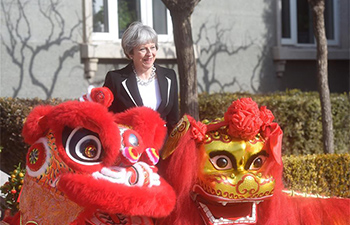
Stock dealers work at a brokerage house in Kolkata, India, on Feb. 1, 2018. The Indian government on Thursday unveiled its budget for the financial year 2018-19, with a focus on agriculture, infrastructure and healthcare. (Xinhua/Tumpa Mondal)
NEW DELHI, Feb. 1 (Xinhua) -- The Indian government Thursday unveiled its budget for the financial year 2018-19, with a focus on farmers, rural poor, healthcare and infrastructure.
This was Prime Minister Narendra Modi government's last full-fledged budget before the 2019 general elections. Modi's Bharatiya Janata Party swept to power in May 2014, with a promise to revive the country's economy and generate jobs.
Finance Minister Arun Jaitley pegged the fiscal deficit target for next year at 3.3 percent -- higher than market estimates -- and also anticipated economic growth above 8 percent in the next fiscal year, as he presented the budget in the Indian parliament.
Announcing a slew of farm-focused measures, Jaitley allocated billions Indian rupees for the country's rural infrastructure and unveiled what he claimed to be the world's largest government-funded free healthcare scheme for around 500 million poor families.
Asserting that the government is committed to increasing the incomes of farmers, he announced the setting up of Agri-Market Development Fund as well as raising the minimum support price to 1.5 times the production cost for Kharif crops, a key demand of distressed farmers.
"Grameen Agricultural Market will provide farmers a means to sell directly to buyers. The focus is on low-cost farming, higher minumum selling price. Our government's emphasis is on generating farm and non-farm employment for farmers," the minister stressed.
On the health sector, Jaitley announced the new National Health Protection Scheme for the poor by providing 500,000 rupees (7,841 U.S. dollars) per family per year for secondary and tertiary care hospitalisation.
"This is the world's largest government-funded health program," he said, adding that the government would set up at least one medical college and a hospital in every three parliamentary constituencies of India.
Though there has been no noticing change in personal income tax slab of citizens, the Indian government has focussed on small and medium-sized enterprises (SMEs) aimed at boosting these businesses as well as creating jobs.
To address the problems faced by micro small and medium scale enterprises, the government cut the income tax slab to 25 percent for small companies. In its last budget, the government provided tax sops to make SMEs more viable, recognizing their importance to generate jobs.
The minister said that "the government has identified 372 basic business reform actions" to take ease of doing business reforms deeper.
Similarly to help domestic smartphone manufacturers, the government announced a hike in customs duty on mobile phones to 20 percent from the current 15 percent. "This will boost jobs in the smartphone sector in India," Jaitley said.
However, markets reacted negative soon after the Indian government announced imposition of long-term capital gains tax at 10 percent. Earlier capital gains tax after one year was nil.
Jaitley also allocated billions rupees for the expansion and modernisation of the ailing Indian Railways, one of the world's largest train networks criss-corssing the country from north to south.
"Strengthening the railway network and enhancing Indian Railways' carrying capacity has been a major focus of the government," he said.
Terming the budget friendly to all sectors, Modi congratulated Jaitley for "allaying the fears of the farmers."
"This budget is farmer-friendly, common citizen-friendly, business-environment friendly and development-friendly. It will add greatly to Ease of Living and livelihood," he said.
"For all the focus on farmers and the rural sector, the budget will accelerate economic growth, as it is focused on all sectors," he added.
Experts said that the government's allocation of billions rupees on rural infrastructure is in an attempt to woo voters in the countryside where two-thirds of India's 1.3 billion people live, given the general elections is due next year and eight states will go to polls this year.














